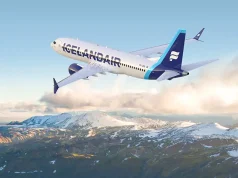
Today the Travalyst coalition, a global partnership founded by The Duke of Sussex together with leading brands Booking.com, Skyscanner, Tripadvisor, Trip.com and Visa, announced the development of draft sustainability frameworks to serve as a cross-channel guide for scoring sustainability practices across the travel and tourism industry. The first three frameworks for accommodation, aviation and experiences are being developed building upon existing standards, with the goal of making them easier to understand for consumers and businesses, and implement and scale across the broadest possible range of travel service providers.
These frameworks will serve as the foundation for an eventual scoring system that would be recognizable by anyone booking holidays and trips across all platforms. The goal is to highlight travel providers with strong sustainability practices already in place and offer people an easy way to understand and identify more sustainable travel options that are kinder and less destructive to local communities, wildlife and environment, but also highlight options that provide positive benefit. The implementation of these frameworks will also act as encouragement for further industry-wide adoption through ongoing outreach, feedback and improvement. These and all future efforts of the Travalyst coalition are being undertaken with strategic guidance from a newly appointed independent advisory group of leading sustainability and travel experts. The initial draft frameworks are being presented for feedback in a series of local industry roundtables and workshops in Scotland at the end of this month.
Scalable sustainability frameworks for the entire travel industry
Building upon the many excellent and thorough standards, initiatives and frameworks already in existence for specific destinations and types of travel businesses, the ambition of the Travalyst frameworks is to bring these existing models together through a universal system that is applicable for all travel service providers in the industry. For the accommodation sustainability framework, being led by Booking.com, this means exploring ways of measuring sustainable practices that have the most impact, for example through waste and water management, energy conservation and sourcing, as well as practices that affect the local community and environment, making sure that they can be applied to all types of accommodation and not just traditional hotels. At the same time, the current aim of the draft accommodation framework is to embrace and recognize the success of existing schemes, for example a property’s existing certification, as a measure and established standard of excellence that ultimately helps ensure recognition within the new system being proposed.
“We know from our research that 82% of our accommodation partners are interested in collaborating with us on the topic of sustainability and that 87% of global travellers think that’s it’s important to consider sustainable properties when travelling,” said Gillian Tans, Chairwoman of Booking.com. “Despite this tremendous interest on both sides, the majority of consumers still don’t know where to start. Even though 70% say that they’d be more likely to book a stay that was eco-friendly, we also see that 72% of travellers aren’t even aware of the existence of eco-labels. This represents a huge opportunity for us as part of Travalyst to help a wider range of accommodation providers showcase their sustainability efforts and in turn make it easier for travellers to find and ultimately book their properties.”
For the aviation sustainability framework being developed by Skyscanner, the focus is on bringing more transparency around carbon emissions for individual flights, while also exploring ways to highlight the overall sustainability practices of individual airlines. For the vastly diverse experiences sector, including everything from massive theme parks to individual tour operators, together with Tripadvisor, the ambition is to customize and weight the sustainability criteria accordingly, while still providing a consistent framework for evaluation and eventual scoring.
These first three frameworks for accommodation, aviation and experiences are now going through the first stages of industry validation, including roundtables to collect feedback from key stakeholders. Pilot activity, including data collection and verification with travel service providers is set to begin over the coming months with the ambition to start testing how to present potential preliminary scoring to customers on the founding partners’ platforms later this year.
New independent advisory group
To provide the independent and critical analysis that is essential to ensure broad adoption and success of Travalyst initiatives and activities, the founding partners have established an advisory group to assess and guide the work of the coalition. Including experts from travel, technology, academia and sustainability, the advisory group is being led by Forum for the Future and chaired by their CEO, Dr. Sally Uren OBE.
The current members of the Travalyst advisory group are:
- Dr. Anna Spenceley, Chair of IUCN World Commission on Protected Areas (WCPA) Tourism and Protected Areas Specialist (TAPAS) Group, Board Member of the Global Sustainable Tourism Council (GSTC)
- Darrell Wade, Co-founder of Intrepid Travel and Executive Chair of the Intrepid Group
- Greg McDougall, Founder and CEO of the Harbour Air Group
- Jeremy Smith, Co-founder, Travindy and Co-founder Tourism Declares a Climate Emergency
- Marten Dresen, Founder and CEO of the Good Hotel Group
- Dr. Xavier Font, Professor of Sustainability Marketing at the University of Surrey, and Head of Impact for Travindy
The advisory group will provide independent strategic guidance for all initiatives put forward by the Travalyst partners, ensure that final outputs have the potential to be scalable and replicable for the entire industry, and help drive positive change as ambassadors throughout the travel and tourism sector.
“I am excited to work in partnership with both the Travalyst Advisory Group and the initiative’s partners to help ensure that Travalyst delivers on its ambition to transform the future of travel and the tourism industry,” said Dr. Sally Uren OBE, Chief Executive of Forum for the Future and Chair of the Travalyst Independent Advisory Group. “We have the opportunity to respond to the climate challenge in a way that simultaneously drives socio-economic development, but taking it means wholesale systems change is our only option. Travalyst is hugely ambitious and the Independent Advisory Group will help the project maintain and deliver transformational change that will benefit both people and planet.”
On-going industry and destination collaboration
As part of Travalyst’s commitment to open up the coalition’s work thus far to wider industry feedback and specific input from key players in strategic destinations, the Travalyst partners are hosting a summit together with VisitScotland on February 26 at the Edinburgh International Conference Centre. Key stakeholders in travel and tourism from across Scotland have been invited to come together with Travalyst for a series of workshops and discussions to explore the sustainability challenges and opportunities at hand, gather critical feedback on the principles and frameworks that have been developed thus far and begin designing pilot projects for further collaboration in Scotland. Sessions will also include discussion on the challenges and opportunities around ensuring Scotland receives socio-economic benefits from travel, with an exploration of some of the activities of local social entrepreneurs.
Based on the outcomes and feedback gathered from this summit, the Travalyst partners will further refine the first sustainability frameworks, begin efforts to collect the necessary data from relevant travel service providers, and implement the first tests to validate findings and surface potential scoring options for consumers over the course of the upcoming year. The partners will also be using the learnings from the summit regarding community involvement to help develop a locally relevant strategy to implementing its frameworks as a pilot program, ensuring that the local community benefits from and ultimately embraces the economic opportunities associated with travel.





